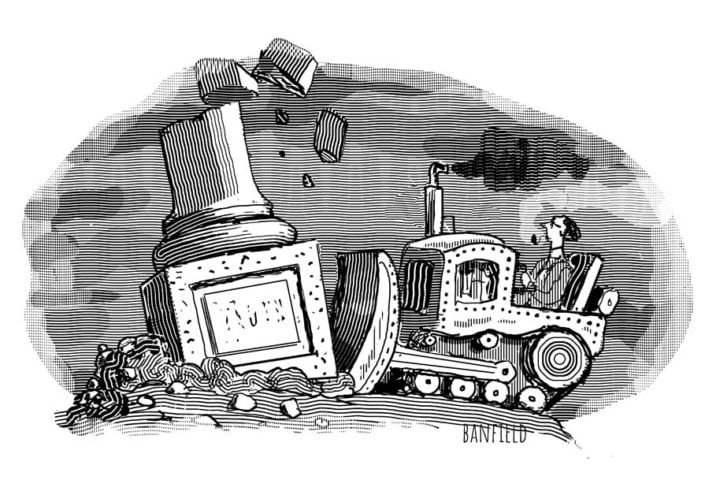Ronald Reagan warned of the problem, then only a fist-sized cloud on the horizon, 33 years ago in his Farewell Address.
Those of us who are over thirty-five or so years of age [i.e., born before 1954] grew up in a different America. We were taught, very directly, what it means to be an American. And we absorbed, almost in the air, a love of country and an appreciation of its institutions.
If you didn’t get a sense of patriotism from your family and neighborhood, you got it from school and popular culture.
By the cusp of the 1990s, however, something had changed for the worse. Reagan captured it in a single understated sentence: “Younger parents aren’t sure that an unambivalent appreciation of America is the right thing to teach modern children.”
The children of those ambivalent parents have grown up and begun to have families of their own, usually with fewer children. The growing uncertainty about the country now extends in many cases to the second and third generation of her puzzled citizens. Is it any wonder that a nation torn between loathing and loving itself seems sometimes to be on the verge of a nervous breakdown?
The American people hardly know what to think about America anymore. Less than three years ago, the New York Times announced in its 1619 Project that American slavery was more fundamental than American freedom. Anti-black racism is “in America’s DNA,” explained the Project’s organizer, Nikole Hannah-Jones, who is black. Yet in the same condemning essay she reconciled with her father, an Army veteran who had flown the American flag in his modest front yard every day of his life. “I had been taught, in school, through cultural osmosis,” Hannah-Jones wrote, “that the flag wasn’t really ours, that our history as a people began with enslavement and that we had contributed little to this great nation.” As a young woman she felt ashamed that “my dad felt so much honor in being an American,” dismissing his patriotism as a “marker of his degradation.”
But the older, wiser Hannah-Jones had somehow come to realize that her father was right after all. “My father knew exactly what he was doing when he raised that flag,” she writes. “He knew that our people’s contributions to building the richest and most powerful nation in the world were indelible.” She draws the moral: “We were told once, by virtue of our bondage, that we could never be American. But it was by virtue of our bondage that we became the most American of all.”
* * *
In some ways it is a beautiful essay that can’t abide the beauty of its own sentiments. It’s the ambivalence, again. She knows her essay amounts—or could amount, with sufficient forgiveness for the undoubted evils in the American story—to a vindication of American patriotism. But she cannot bring herself to make the full-throated pledge of allegiance her father did, even though she is attracted to it and understands now why he made it. Like so many others, she cannot bring herself to believe in her country’s principles, because it would be unsophisticated or politically incorrect to do so. She is left with a paradox: how systemically racist can America be, if its downtrodden are responsible for almost all of its political and moral progress? Though a small consolation, it’s what keeps her analysis from veering into open anti-Americanism, where so many on the far Left seem to want to go these days.
It’s not only the Left, however, that is alienated from America and its political tradition. Some conservatives, too, see the Declaration of Independence and the Constitution not as the beginning of a solution to our present discontents but more like the distant cause of them. For critics like Patrick Deneen and Yoram Hazony, these considerations are part of an argument about the influence of Aristotle, Locke, Burke, and others on American law and life, and whether our citizens have lost touch with their own well-being. It’s a dissent that’s gaining adherents, particularly among the young—those who have seen their countrymen lose wars, ship manufacturing jobs to China, stay home from church and synagogue, and addict themselves to online pornography and social media. Their America is not a pretty place.
One encounters a surprising number of conservatives who are, accordingly, ambivalent about America. They don’t so much oppose it, as wish to move beyond it. They are almost post-American. Will we have to choose between the anti-Americans and the post-Americans, or is a republic graced by thoughtful American patriots still possible?




